高一英语 Earthquakes reading
高一英语必修1_第四单元earthquakes reading
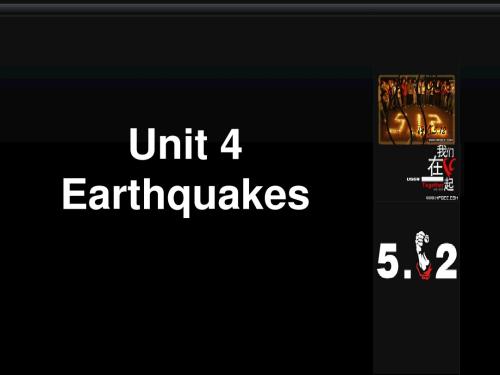
Para. 2-3
Para. 2-3
Data(数据)
of the nation did not feel the earthquake .
2/3
In
A huge crack that was 8
15
terrible seconds a large city lay in ruins.
kily’s hospitals,25% _ of its factories and buildings and 10% of its homes did not disappear
Part 3
After the earthquake (rescue)
What did the soldiers do to help the survivors?
1
2
3 4
Signs of an earthquake:
• 1.The water in the wells rose and fell. And some deep cracks could be seen in the well walls. A smelly gas came out of the cracks • 2.The chickens and even pigs were too nervous to eat. • 3.Mice ran out of the fields looking for places to hide. • 4.Fish jumped out of bowls and ponds • 5.People could see bright lights in the sky
A NIGHT THE EARTH DIDN’T SLEEP
人教版高中英语 必修一 Unit4 《EarthquakeReading》 课件 (共33张PPT)
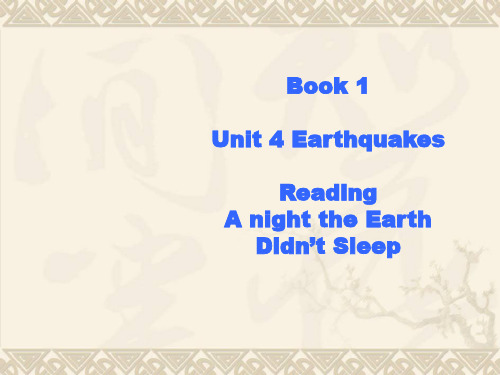
❖
Reao get the main idea.
Task 2
Divide the text into 3 parts.
❖Before the earthquake ❖During the earthquake ❖After the earthquake
Task 1
火山爆发
earthquake
❖
9、要学生做的事,教职员躬亲共做; 要学生 学的知 识,教 职员躬 亲共学 ;要学 生守的 规则, 教职员 躬亲共 守。21.8.1121.8.11Wednesday, August 11, 2021
❖
10、阅读一切好书如同和过去最杰出 的人谈 话。12:49:5012:49:5012:498/11/2021 12:49:50 PM
❖Before the earthquake ❖During the earthquake ❖After the earthquake
Part 1 (signs)
What are the signs before the earthquake?
Things
What happened
the water in the wells the well walls chickens & pigs mice fish in the sky the water pipes
Book 1
Unit 4 Earthquakes
Reading A night the Earth
Didn’t Sleep
How many natural disasters do you know?
flood drought
typhoon
fire
Tsunami (海啸)
人教版高中英语 必修一 Unit4 《Earthquake---Reading》 课件 )(共34

• What should we do to protect ourselves if an earthquake is happening now in our classroom?
*Keep calm and don't be nervous. *Stay where you are. *Protect your head by putting your bag/hands
The numbers tell us that the earthquake caused a lot of deaths(死亡) and damage (损失) to the victims(受害者).
Fill in the blanks according to paragraph 3.
1.Bricks covered the ground like red_le_a_v_e. s 2.Dams and bridges fell and were not _s_a_fe_. 3.The railway tracks became useless_s_t_e_e_l .
Then later that afternoon, another big quake
_s_h_o_o_k_ Tangshan. But all hope _w__a_s_n__o_t_l_o_s.t _S_o_l_d_ie__rs_ came to help those _s_u__rv_i_o_r_s_. Slowly, the city began to _b_r_e_a_th__e_a_g_a_in__.
• paragraph4 All hope was not lost.
outline of the text
高一英语精品课件Unit4 Earthquakes-reading(新人教版必修1)

A NIGHT
THE EARTH DIDN’T SLEEP
Fast reading
What does the passage mainly talk about? An earthquake happened in Tangshan in 1976.
Sum up the main idea of each part of the passage.
signs before the earthquakFra bibliotek Para.1
Fill in the blanks Main Idea Details
3:42 am, the __________ greatest earthquake of • At _____ the 20th century began . Steam burst from holes in the ground. •_______ dirt •Hard hills of the rock became rivers of ____. Bricks covered the ground like red •________ autumn leaves. dams and most of the bridges fell. • Two _______ • The railway tracks were now useless steel _________pieces of _______. Sand now filled the wells instead of water. •______ •Water,food,and ______________ electricity were hard
•Strange ________ things were happening in the countryside of northeast Hebei. rose and fell •The water in the wells ____ ______. smelly gas came out of the cracks. •A _______ •The chickens and pigs were too nervous ________ eat to _____. • Fish jumped ________out of the bowls and ponds. •Mice _____ ran out of the fields. •At ______ 3:00 am on July 28, 1976, people bright lights saw ________ _______ in the sky.
高中英语必修1-必修1 Unit4 Earthquakes reading 课件
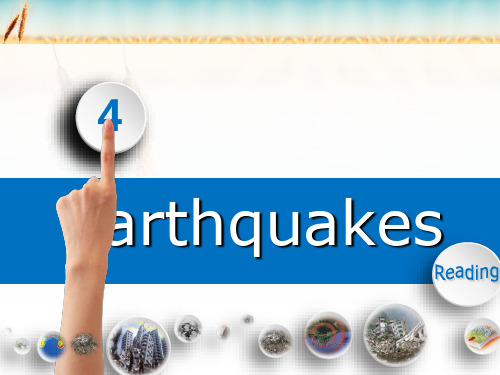
Post-reading
What would you do to help the people in Tangshan, if you were... ?
(Discuss in groups and then each group sends a student to present the ideas.)
What's the feeling of people in Tangshan after the earthquake ? Why?
On one hand, they might feel sad. Because most of them lost their families and their homes were destroyed. On the other hand, they didn't lose hope. Because the army and workers came to help them.
F
It seemed as if the world was at an end.(L9)
2. The number of people who were killed
reached more than 400,000.
F
The number of people who were killed or injured reached more than 400,000.(L16)
Un4ti
Earthquakes
Leading-in
1. What can you see in the video? 2. What's your feeling ?
Reading
A NIGHT
高中英语人教版必修1unit4EarthquakesReading教案(系列三)
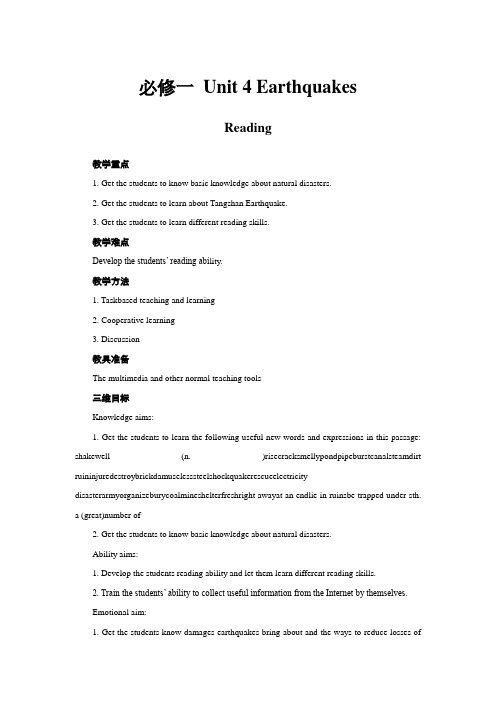
必修一 Unit 4 EarthquakesReading教学重点1. Get the students to know basic knowledge about natural disasters.2. Get the students to learn about Tangshan Earthquake.3. Get the students to learn different reading skills.教学难点Develop the students’ reading abi lity.教学方法1. Taskbased teaching and learning2. Cooperative learning3. Discussion教具准备The multimedia and other normal teaching tools三维目标Knowledge aims:1. Get the students to learn the following useful new words and expressions in this passage: shakewell (n. )risecracksmellypondpipeburstcanalsteamdirt ruininjuredestroybrickdamuselesssteelshockquakerescueelectricity disasterarmyorganizeburycoalmineshelterfreshright awayat an endlie in ruinsbe trapped under sth.a (great)number of2. Get the students to know basic knowledge about natural disasters.Ability aims:1. Develop the students reading ability and let them learn different reading skills.2. Train the students’ ability to collect useful information from the Internet by themselves.Emotional aim:1. Get the students know damages earthquakes bring about and the ways to reduce losses ofearthquakes.2. Get the students to know how to protect oneself and help others in earthquakes.3. Get the students to be aware of terrible disasters, meanwhile get them to face it, treat it in a proper way, and never get discouraged.教学过程设计方案(一)→Step 1 LeadinShow the students some pictures about natural disasters and ask them:1. Have you ever experienced any natural disaster? Look at the pictures. Can you name all the disasters?(volcano, fire, typhoon, flood, sandstorm, hailstone, thunderstorm, hurricane, earthquake)2. Have you ever experienced an earthquake? Can you describe how terrible an earthquake is?地震的破坏(The earth is shaking all the buildings will fall down the roads will be destroyed many people will be killed or injured a lot of children will bee orphans. . . )→Step 2 Warming upTurn to Page 25. Ask the students to read and look at the photos of Tangshan and San Francisco to describe what they see in the two photos to a partner.(beautiful cities broad roads tall building large population. . . )Imagine there has been a big earthquake in these two cities, what might happen to all the things in the photos?(If a big earthquake happened, the whole cities might be in ruins. Large quantities of tall buildings might collapse. The broad and busy roads might be destroyed. Many people might be killed or injured. . . )→Step 3 Prereading1. Imaging and sharingImagine there is an earthquake now. Your home begins to shake and you must leave it right away. You have time to take only one thing. What will you take? Is it money, water, fruits, mobile phones, a torch light, or anything else? Why?2. Talking and sharingWhat do you think may happen before an earthquake? Talk about the pictures on Page 25.(Cows, pigs and dogs bee too nervous to eat. Mice run out of the fields looking for places to hide. Fish jump out of ponds. The water in the well will rise and fall. The well walls will have deep cracks in them. There will be bright light in the sky. . . )→Step 4 ReadingTell the students:Today, we are going to read a news report about the strongest earthquake in China’s history, which happened in Tangshan, Hebei, in 1976.1. Fast readingAsk the students to read the passage quickly and pay attention to the first sentence of each paragraph.1)Answer the questions.Question 1:In what order was the passage written?Question 2:What is the general idea of the passage?(The text is written in time order. The general idea is the mixture of the first sentences of each paragraph, that is, the text tells us something that happened before the earthquake, during theearthquake and after the earthquake. )2)Fill in the table.Type of writingTopic sentence of Paragraph 1Topic sentence of Paragraph 2Topic sentence of Paragraph 3Topic sentence of Paragraph 4General idea of the passageSuggested answers:Type of writing This is a news report.Topic sentence of Paragraph 1 Strange things were happening in thecountryside in northeast Hebei.Topic sentence of Paragraph 2 Everything began to shake and it seemed thatthe world was at an end.Topic sentence of Paragraph 3 Everywhere they looked nearly everything wasdestroyed.Topic sentence of Paragraph 4 All hope was not lost.General idea of the passage The passage tells us something that happenedbefore the earthquake, during the earthquakeand after the earthquake.3)True or False?Ask the students to decide whether the following statements are true or false. If it is false, try to correct it.(1)People in Tangshan were warned of the earthquake and didn’t go to bed that night.(2)People in Beijing also felt the earthquake.(3)More than 400 000 people were killed in the quake.(4)Many rescue workers and tors were trapped under the ruins during the aftershock.(5)People tried to get fresh water from under the ground in Tangshan.Suggested answers:(1)FPeople in Tangshan thought little of the signs of the earthquake and went to bed as usual that night.(2)T(3)FMore than 400 000 people were killed or injured in the quake.(4)T(5)FFresh water was taken to the city Tangshan by train, truck and plane.2. Reading carefullyAsk the students to read the passage carefully to locate particular information.1)Do the exercises in the part prehending on Page 27.2)Fill in the following form.Time What happened ResultBefore the earthquake:three days before the earthquakeat about 3 am on July 28Wells:Animals:Lights and sound:Water pipes:People of the citythought______________and______________While the earthquake:At 3:42 amLater that afternoonHouses, roads andcanals:Hard hills of rock:The large city:The people:Some rescue workers andtors:More buildings:Water, food and electricity:______________ wasdestroyed.______________hospitals, 75%of______________ and 90%of______________ were gone.More than______________were killed or injured.After the earthquake All hope:The army:Workers:Fresh water:The city______________.3)Choose the best answer:(1)What is the mood of this passage?A. Sad.B. Serious.C. Serious and a bit sad.D. Calm.(2)What can be inferred from the passage?A. If mice run out of the fields looking for places to hide, there must be an earthquake.B. If some natural signs had not been ignored, all the people in Tangshan city might have had a chance to survive.C. There wouldn’t have been such a great earthquake, if people had paid enough attention to some natural signs.D. If some natural signs had not been ignored, more people might have had a chance to survive.(3)Which of the following statements can not be part of the main reasons for the heavy loss of life in Tangshan earthquake?A. The earthquake happened in the deep night and people were sleeping in bed at the very movement.B. There weren’t enough rescue workers.C. The buildings were poorly constructed and most of them were destroyed in the earthquake.D. People were not careful enough to notice some natural signs before the earthquake.(4)How do you understand the real meaning of the idiom “It is always calm before a storm”?A. It is unusually quiet before a thunderstorm or hurricane hit.B. One should not trust situations that seem peaceful since bad things may happen.C. The weather is fine before a storm es.D. You should stay calm before a storm.Suggested answers:(1)C(2)D(3)B(4)B3. Language problemsWhile checking the answers with the whole class, deal with any language problems that the students can’t understand.4. Reading aloudPlay the tape of the passage for the students to listen and follow. Then play the tape of Paragraph 1 of the passage once more this time the students listen and repeat.→Step 4 GameWork in pairs. Suppose you are a newspaper reporter, and the other is a witness of the 1976 Tangshan Earthquake. Now the newspaper reporter is interviewing the witness.→Step 5 ExtensionShow the questions on the screen and have a discussion.1. From whose point of view are events described? How do you know?2. What is the mood of this passage? How is it created?3. Why do you think the writer chooses to express his feelings about the quake rather than simply report what had happened?4. Why does the writer use A NIGHT THE EARTH DIDN’T SLEEP as the title?5. What does the sentence “Slowly, the city began to breathe again” mean?Suggested answers:1. A writer’s who didn’t see the earthquake. He uses the thirdperson to describe the quake. His description is very objective. For example, in the second sentence of the third paragraph “Everywhere they looked nearly everything was destroyed. ”, the writer uses “they” instead of “we”.2. The mood is serious and a bit sad. It is created by giving details of how many people and animals were killed or injured and how many buildings were destroyed.3. Although the writer was not there, he felt sad for the people of Tangshan. He knows that giving some personal feelings will make the reading more interesting.4. I think the reason is that, as usual, night is the time to sleep, and night should be safe and quiet. But that ni ght everything changed. The writer uses A NIGHT THE EARTH DIDN’T SLEEP as a title to show how terrible and how unusual that night was.5. Here we can see that the writer pared the city to a person who suffered a lot in the disaster. He felt her pain, and he worried about her. So when he said that people came to help her, we can feel his feelings to her. The city will not die, she has hope and she can recover from the pain.→Step 6 ConsolidationAsk the students to read the passage again and try to retell it.One possible version:Strange things happened in Tangshan. For three days the water in the village wells rose and fell. The well walls had deep cracks and a smelly gas came out the cracks. The chickens, pigs and mice were too nervous. Fish jumped out of bowls and ponds. At 3:00 am on July, 1976, people saw bright lights in the sky and heard the sound of planes even when no planes were in the sky. The water pipes in some buildings cracked and burst.At 3:42 am everything began to shake. It seemed that the world was at the end Onethird of the nation felt it. A huge crack cut across the city. In fifteen terrible seconds a large city lay inruins. Twothirds of the people died or were injured. Nearly everything was destroyed in the city. 75% of its factories and 90% of its homes were gone. Then later that afternoon, another big earthquake shook Tangshan. People began to wonder how long the disaster would last.All hope was not lost. The army sent 150 000 soldiers to help them. Workers built shelters for survivors. Slowly, the city began to breathe again.→Step 7 Homework1. Learn the new words and expressions in this part by heart.2. Read the text again and again and write a summary of the text.。
人教版高中英语必修一 Unit 4 Earthquakes Reading 课件(共27张PPT)

Two-thirds of the people died or 12
_w_e_r_e_in_j_u_r_e_d_. Then later that afternoon, another big quake 13 _s_h_o_o_k_ Tangshan.
People began to wonder 14
Sum up the main idea of each paragraph. (use one word to describe it)
Para1 Para 2&3
Detailesidgns readingdamages
Para 4
recovery
Para 1 Main Idea
Details
Unit 4
Earthquake
Reading
volcano
typhoon
natural disasters
flood
earthquake
earthquake
fire …
flood
drought
[tsuː'nɑːmi]
[draʊt]
tsunami
natural disasters
海啸
typhoon
Damage began .
caused by 13_______ burst from holes in earthquake the ground.
Para. 2-3 Part 2
Hard hills of the rock became rivers of 14 ____.
15 ________ covered the ground like red autumn leaves.
高一英语:Unit4 Earthquakes- Reading(新人教版必修1)(必修1)(精品课件)

Why the title is A NIGHT THE EARTH DIDN’T SLEEP? Why were so many people killed or injured?
What does the sentence “ Slowly, the city began to breathe again” mean
They were all hungry and the food ______good. smelt
I can ______something burning in the kitchen. smell
Please throw the _______fish away. smelly smells paint. The house _______of
1. What natural signs of a coming disaster were there? 2. Can you think of some reasons why these signs weren’t noticed? 3. What events probably made the disaster worse? 4. What situations probably made the disaster worse? 5. How were the survivors helped?
Look at the each part and write down its main idea.
Part 1
Paragraph 1
Paragraph 2
Before the earthquake strange things began to happen but no one took any notice of them.
人教版高中英语 必修一 Unit4 《Earthquake---Reading》 课件 (共23张PPT)

Step2 Fast reading
1.Skimming the passage to get the general idea and find out the topic sentence for each paragraph
Skimming Reading comprehension I
The passage mainly talks about a/an _ea_r_t_h_q_u_a_k_e__ that happened in T__a_n_g_sh__a_n_ in _1_9_7_6__.
Reading Comprehension II
1. The earthquake began at ________. A. 3:00 am, June 28, 1976 B. 3:00 am, July 28, 1976 C. 3:42 am, July 28, 1976
2. _________ people were killed or injured in the quake. A. Less than 400,000 B. More than 400,000 C. More than 150,000
Paragraph 1
1.What strange things happened before the earthquake? 1 .water in the village wells rose and fell 2 .well walls developed deep cracks 3 .a smelly gas came out of the cracks 4 . chickens and pigs were too nervous to eat 5.mice ran out of the fields 6.fish jumped out of their bowls and ponds 7. bright lights appeared in the sky 8. the sound of planes could be heard although there
人教新课标 高一 Unit 4 Earthquakes reading全英文说课稿

Lesson Plan InterpretationTeaching material: NSEFC Book 1 Unit 4 EarthquakeHello! Ladies and gentlemen. Today my topic is Unit 4 reading. Now allow me to introduce the first part:Ⅰ. Analysis of the teaching materials:1.The importance of this lessonThis lesson is a reading passage. It plays a very important role in English teaching of this unit because we should lay particular emphasis on the students’ reading ability in senior English teaching.2.What to teach -teaching contents1.)get some basis knowledge about Tangshan earthquake2.)get the students to comprehend the passage better3.)do some listening, speaking and writing4.)moral educationIn this passage we should help the students get some knowledge about the Tangshan earthquake. At the same time we ought to get the student to comprehend the passage better. The students should do some listening, speaking and writing, too. Of course, the students should receive some moral education.3.The important and difficult points in this lesson:Important points:1.)some knowledge about earthquakes2.)to improve the students reading abilityDifficult points:using the learned phrases and sentence patterns to express one’s ideasⅡ. Teaching aims:My teaching aims includes 3 parts: knowledge aim, ability aims and moral education aims1.Knowledge aim: by the end of the lesson, students will have a better understanding of themeaning and structure of the text.2.Ability aims:1.)use what we have learned to describe what would happen before – during – after theearthquake2.)improve the read ing skill and use English to express one’s ideas3.Moral education aims: learn the bravery of facing the natural calamity from people inTangshan and we should always hold an optimistic attitudeⅢ. Analysis of the teaching theories and methods:That’s all for my teaching aims. Now let’s focus on the third part, Analysis of the teaching theories and methods. When I deal with this lesson. I’ll do my best to carry out some teaching theories of the new curriculum: taking the students as the host and the teacher subordinate .Carry out task-based learning and cooperative learning. Let the students receive some moral education while they are learning the English language.1.Teaching theories: The new curriculum (“taking the students as the host and the teachersubordi nate”, “Cooperative learning”, “Take-based learning”, “Communicative learning”)2.Teaching methods: “Communicative Language Teaching”, “Take-based Activity”3.Learning methods: “Discovering learning”, “Cooperative learning4.Teaching aids: A tape recorder, the blackboard and PPTSince it is a reading passage, it is very important to develop the students’ reading ability. I’ll use some reading methods such as preparation for reading, (lead-in) scanning, skimming and intensive reading (in-depth reading or study rea ding). In class, I’ll try to use encouraging and polite remarks such as “Do you want a go?” “volunteers” “Well done!” “You did a good job!” “Thanks!” and so on. I’ll get the students to have a competition to develop their quick response. I’ll make full use of modern equipment such as the multi-media and tape recorder to make the class more lively and interesting.Ⅳ. Analysis of the students:The students are in Grade 1. They are still at an age that would like to have competition with others. They have known something about the earthquakes. Some long sentences are difficult for them to understand. So I will help the students in different levels to learn English.Ⅴ. Analysis of the teaching process: Now came to the most important partStep1. Lead-in:1.)show some pictures of Tangshan (before the earthquake)2.)let the students to imagine what would happen after the earthquake (ask some studentsto speak out their ideas)My purpose here is to let the Ss know what we are going to look atStep2. While reading: in this step I will let the students read the text twice1.fast reading: scanning & skimming1.)first tell the students this passage can be divided into three parts and tell them the clueof the story : time order (tell them to pay attention to the first sentences of each para.)2.)read silently to get the structure (after several mins I will discuss the structure with thestudents)Part 1 (para 1) Strange things were happening before the earthquake, bot no one took any notice of themPart 2 (para 2-3) The earthquake destroyed the city of Tangshan and shocked the people very muchPart 3 (para 4) The army came to help the survivors, bringing hope for a new life2.careful reading: intensive readingdo the exercise in students’ book in P27 1,2 (a competition: divide the Ss into four group, and then the one who stand up fast and give the right answer can get ten marks for his group, the group which gets the highest mark will get a present)Step3. Consolidation:1.listen to the tape and read the passage aloud (Play the tape of the passage for thestudents to listen and then ask them to read it aloud. Tell them to pay attention to thepronunciation, stress and intonation while listening. At the same time they can enjoythe beauty of the English language. And it can prepare the students for the retelling innext step.)2.fill in the blank with proper words3.retell the story in your wordsSince the students in the class are in different levels, so first I will let them to fill in the blank to get an expression of the general idea of the textStep4. Post reading -discussion1. a short video about the 5·12 Wenchuan earthquake2.pictures of Tangshan and Wenchuan (on the screen)3.discuss: What can we do for the rebuilding of Wenchuan and how can we protectourselves if an earthquake happens?4.volunteersoptional: show them some pictures of Wenchuan people and tell the Ss: Where there is a life, there is hopeStep5. Homework1.read the text again after class and figure out the meaning of the following complexsentences (so these in class if time allow)2.write a short paragraph to describe what had happened before – during – after theearthquake using your own words3.surf the Internet to learn more about how to protect yourself and people if anearthquake happenⅥ. Contents on the blackboardUnit 4 EarthquakeA Night the Earth didn’t SleepStructure of the whole passage:Clue of the story: Time orderBefore – during – after the earthquakePart 1 (para 1) Strange things were happening before the earthquake, but no one took any notice of themPart 2 (para 2-3) The earthquake destroyed the city of Tangshan and shocked the people very muchPart 3 (para 4) The army came to help the survivors, bringing hope for a new lifeHomework for today:Ⅶ. My teaching dailyIn this lesson, I lead the students understand the passage step by step, and help them to retell the story and hold a discussion. But there are some new language points in the passage, so I will explain them for the students next period.Ok, that’s all for my interpretation. Fo r the time is limited, there must be some mistakes in my interpretation; I hope you can give me some suggestions.。
高中英语必修1-Earthquakes reading

Animals T__e_n_s__o_f__t_h_o_u_s_a_n_d_s_ of cows would
Animals
never give milk.H_a__lf__a__m__il_li_o_npigs and _m_i_l_li_o_n_s__o_f chickens were dead.
Crack
Crack
__8___kilometres long and __3_0___ metres wide.
People _2_/_3_ of people died or were injured.
People The number reached_4_0_0_,_0_0__0.
Buildings _A_l_l of the hospitals, _7_5__%_ of the Buildings factories and 9__0_%_ of homes were gone.
rescued the coal built shelters for
msiunrevrivsors[Rrɪh'dtɒeetrvoɪikrc(iecəa)ll]
5. transported fresh water (修辞手法)
Result: The city began to breathe again.
Personification(拟人)
Part1
(Para.1)
A. Rescue after the earthquake
Part2
(Para.2&3)
Part3
(Para.4)
B. Signs before the earthquake
C. Damage during the earthquake
高中英语:UnitEarthquakesReading(新人教必修)
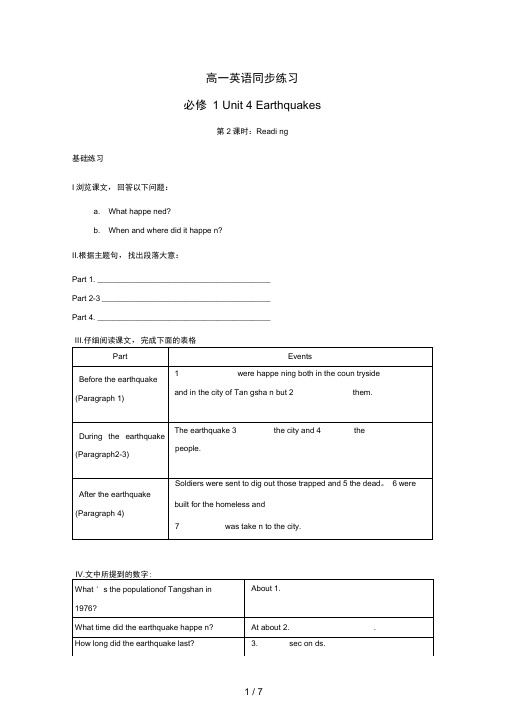
高一英语同步练习必修 1 Unit 4 Earthquakes第2课时:Readi ng基础练习I浏览课文,回答以下问题:a. What happe ned?b. When and where did it happe n?II.根据主题句,找出段落大意:Part 1. _______________________________________Part 2-3 ______________________________________Part 4. _______________________________________1. People in Tan gsha n were warned of the earthquake and did n'go to bed that night.( )2. People in Beiji ng also felt the earthquake, )3. More than 400,000people were killed in the quake.( )4. Many rescue workers and doctors were trapped under the ruins during theaftershock.( )5. People tried to get fresh water from un der the groun d.( )VI.根据课文完成下文:1 ______________ h appe ned in Tang Shan. For a few days. Wateri n thewells 2 ____________ . From the 3 _____ of wells 4 ______________ c ome out.Mice, chicke n, pigs and even fish became 5 ______ . At 3:00 am, everyth ing bega nto 6 _____ .It seemed that the world was 7 ________________ . 8 _____ -___of the n ati on 9 __ it. 10 _________________ cut across the city. The city lay11 ____________ .Two-thirds of the people 12 ____ or 13 ___________ . The n later that after noon,ano ther big quake 14 ___________ Tang Shan. People bega n to won der15 ___________________________________ __________________ . But 16 _________________ . 17 ______ came to help those 18 _________ . Slowly, the city began to 19 ______________ .实战演练I. 短语翻译:1. 对某人评价不好,对...不当一会事 ________________20. be proud of / take pride in __________II. 完成句子1. 于教授在演讲之前先理顺了一下自己的思路。
高中英语 Unit4 Earthquakes- Reading优质课件 新人教版必修1
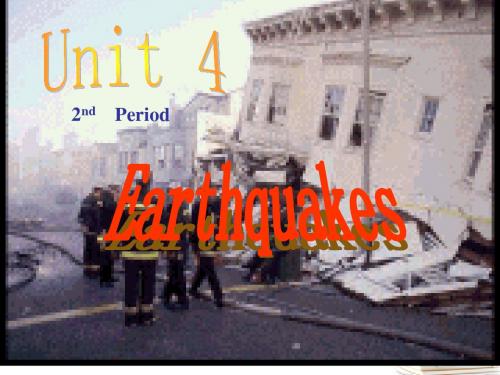
reach : to achieve of obtain sth. 11. Some of the _r_e_s_c_u_e__workers and doctors were t_r_a_p_p_e_d_under the ruins.
rescue : (n) an act of rescuing or being rescued rescue : (v) to save or set free from harm,
1. What natural signs of a coming disaster were there?
2. Can you think of some reasons why these signs来自weren’t noticed?
3. What events probably made the disaster worse?
4. water pipes in some
buildings_c_r_a_c_k_e_d_and __b_u_r_s_t _.
burst : to come open or fly apart suddenly
- 1、下载文档前请自行甄别文档内容的完整性,平台不提供额外的编辑、内容补充、找答案等附加服务。
- 2、"仅部分预览"的文档,不可在线预览部分如存在完整性等问题,可反馈申请退款(可完整预览的文档不适用该条件!)。
- 3、如文档侵犯您的权益,请联系客服反馈,我们会尽快为您处理(人工客服工作时间:9:00-18:30)。
The deadliest earthquake of the 20th century an earthquake measuring7_._8 on the Richter scale
3:42 am on July ,28
_2_4_0_,0_0_0_-_--_2_6_0_,0_0_0_people died over __1_6_0_,0_0_0__were severely injured in 7,218 households, all members of the family were killed by the earthquake.
Homework
1.Preview the passage and recite the last part. 2.Finish learning about language 3.Finish using structures (1) on P64
2.Stay on the balcony
3. Jump out of the tall building
4. Use the lift
3.If you stay in the open air ,keep off the tall building, and go to the fields without trees .
11 kilometers one-third 8 km and 100 km in 15 seconds two- thirds Thousands of
400,000 75%, 90% two Tens of thousands of
Half of a million
How were the people helped?
Summary:
Several days before July 28, 1976, many st_r_a_n_g_e___ things happened in Tangshan. They were signs for the e_a_rt_h_q_u_a_k_e___. At 3:42 am that day, the earth began to s_h_a_k_e__, which destroyed the city. Later that afternoon, another big earthquake s_tr_u_c_k____ Tangshan. More people were killed or injured and
had deep cracks and a smelly gas came out
were too nervous to eat
ran out of the fields , looking for places to hide
jumped out of bowls and ponds
The damage it caused:
Please divide the passage into 3 part:
signs damage recovery
PaБайду номын сангаас1
Par2-3
Par4
the water in the village wells
the well walls
the chickens and pigs
mice
fish
Strange things rose and fell
Don’ts
1. Be close to the outside wall
2.Hide under the table or bed , if you haven’t time to escape , you may stand close to the inside wall with some things covering on the head.
☆The army organized teams to dig out those
who were trapped and to bury the dead.
☆ Miners were rescued from the coal
mines.
☆ Shelters were built for survivors whose
more buildings f_e_ll___ down. Soldiers were called in to help the rescue workers. Te_a_m__s___ were organized to dig out the t rapped and b_u_ry____ the dead.
homes had been destroyed.
☆ Fresh water was taken to the city.
Discussions
What shall we do or not do if an earthquake happens?
Dos
1.Stay in a small room,such as kitchen or bathroom
